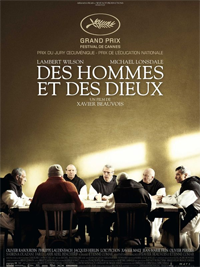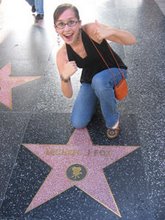Last night I saw Of Gods and Men, or Des Hommes et des Dieux, Xavier Beauvois' film about the monks of Tibhirine which recently won the French César Award for Best Film. The film relays events surrounding the true story of French Trappist monks in 1996 during the Algerian Civil War. After coexisting peacefully for years with their Muslim neighbors, the monks find themselves in the crossfire between the Algerian army and groups of Islamic extremists. I am never sure what my policy should be on spoiling true events, but you can check out the Wikipedia entry of the real-life monks here.
The film begins with a very sweet and rather lighthearted look into the role of the monastery in its neighboring Muslim village. Brother Luc is a kindly doctor, seeing 100 patients a day for illnesses and life advice. The monastery's leader, Brother Christian, helps villagers with paperwork, brings wares to the marketplace, and oversees Mass for his brothers. Neighbors help them with gardening and other assistance, and it's made clear that over the years, the monastery has acted as a backbone to the community.
Once the terrorist threat is established, after a nearby group of Croatian workers is killed by the Armed Islamic Group and the monks are asked to leave the region for their own safety, the main drama among the characters is whether or not the monks should abandon their post. The brothers explore fear, discuss martyrdom, kinship to their community, and faith in times of crisis. While there are a number of scenes that do drag on, without providing much benefit to the story, there is a wonderful sequence in which the monks listen to Tchaikovsky's Swan Lake, enjoy some wine, and wordlessly express fear, contentedness, and love in their wonderful (and wonderfully framed) facial expressions.
Faith and brotherhood are the most important themes to the characters, and it is often beautiful how much love is shown among them. When Brother Christophe struggles with fear and a shaken resolve, tender old Brother Amédée rubs his shoulders. Asthmatic and aged Brother Luc is helped by Brother Christian, who turns his light off as he snores, and Brother Célestin who reads the newspaper to him when he is ill. The actors' performances were very impressive, mimicking years of love for each other, and rivaling any impressive portrayal of family.
Brother Christian is, like many monks, an academic, and his study of the Koran both enriches his spiritual knowledge and helps him connect with his neighbors. Even one of the terrorist leaders acknowledges some respect for the monks when he realizes they revere Jesus, who is honored as a prophet in Islam. I don't really know enough about Algerian political history to discuss the context of this film, so I was left with some questions at the end. Given the well-known French Islamophobia and the long-standing antagonism between France and Algeria, I am curious what better educated viewers' reactions were to the film.
Tuesday, March 1, 2011
Subscribe to:
Post Comments (Atom)





No comments:
Post a Comment